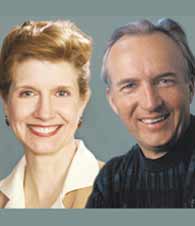|
Executive Interviews: Interview with Don Peppers and Martha Rogers on CRM
January 2008
-
By Dr. Nagendra V Chowdary
For a customer, when can variety be
helpful and when can it be harmful?
Could you provide some real world
examples where companies led their
customers into overchoice and also
examples of companies who
understood this problem and created
an effective product mix?
It is a well-known axiom in direct
marketing that the surest way to
depress response is to offer customers
a choice. Asking a customer to choose
represents one more hurdle that lies
between the customer and the sale. It
is important to realize that
fundamentally customers do notwant
choice; they just want exactly what
they want
|
|
Being agile may help
manufacturers become more costefficient in introducing
more
and more variety, but unless agility is
directed at mass customizing in
response to actual demand, customers
will not think you're agile only
bursting with options. Complexity
and costs on the shop floor will only
be replaced by confusion and chagrin
on the shopping floor. -
What is your practical advice to
managers to avoid overchoice?
The mission of a 1to1 marketer is to
figure out exactly what individual
customers need (often through direct
collaboration), and then produce it,
generally using design tools that
eliminate the problem of too much
choice. And they can do this
efficiently, at a price customers are
willing to pay and at a cost that allows
for profitable margins. Mass
customization is not being everything
to everybody; rather, it is doing only
and exactly what each customer
wants,when hewants it. Indeed,most
1to1 marketers find that although
there may be a significant up front
investment in developing the
products, processes and technologies
required mass customized products
can be produced at costs that are very
nearly as low asmass-produced costs.
And for some products, mass
customization actually costs less,
particularly when markets become
fragmented enough that mass
production techniques can no longer
effectively predict what customers
need. -
Marketers have lost the forest for the
trees, focusing too much on creating
products for narrow demographic
segments rather than satisfying needs.
Customers want to 'hire' a product to
do a job or, as legendary Harvard
Business School marketing professor
Theodore Levitt puts it, "People don't
want to buy a quarter inch drill. They want a quarter inch hole!" Does CRM
help in identifying and defining the
real customer needs?
One very succinct definition of CRM
is "treating different customers
differently" which simply means
behaving differently towards a
customer based on the characteristics
of the customer. To be successful at
CRM you must know how your
customers are different. And
customers are different in two
fundamental ways they have
different values to the firm, and they
need different things fromthe firm.At
most companies, a great deal of effort
and analysis goes into understanding
who themost valuable customers are,
while considerably less attention is
given to understanding how different
customers are in their needs. There
sult is that a firmwill persist in seeing
the problem through its own eyes
rather than through the eyes of the
customer, focusing on the drill rather
than the hole. All marketing involves changing
the customer's behavior. But with
CRM, the firm can take individual
initiatives, with respect to one
customer at a time, as appropriate to
each customer. You cannot change an
individual customer's behavior
without appealing to somemotivation
or need that the customer has. CRM,
in effect, forces a firm to try to see its
business situation through the eyes of
the customer. -
In multi-sided markets, some
customers contribute to a company's
bottom line directly while others
contribute indirect benefits,which are
more difficult to calculate. How to
reach out to these indirect customers?
How should companies leverage their
associations?
We think all forms of customer
contribution need to be tallied and tracked by a marketer, in order to
prioritize marketing efforts among
different customer groups. In pharma,
for example, highly influential
physicians will have a
disproportionate impact on the
success of various drugs and
medicines. But in all industries now,
with customer reviewsites and online
social networking, the opinion of one
customer has the possibility of
influencing dozens, or perhaps many
thousands, of other customers. While word-of-mouth marketing
seems to be a hot topic these days, we
don't think it is easy to do or manage,
because of the inherently randomway
in which customer networks evolve.
Rather, it is best to lay as much
groundwork for favorable word-ofmouth
as you can by always working
to earn the trust of your customers. -
Companies have more or less
ignored 80% of the world's
population the global poor. Should
the world's poor, who individually
have less than $5 a day in disposable
income, be a viable market for new
goods and services?What are some of
the challenges that companies face
operating at the base of the pyramid?
Certainly, the poor are very different
consumers from the more affluent.
What kind of business models are
needed?
While we don't deal with this issue
specifically in our 1to1model, there is
no reason why poorer people would
not be just as desirous as those more
well-off of strong relationships with
vendors they can trust. We think the
problem of chronic poverty is not a
businessmodel issue, but in almost all
cases a governmental and regulatory
issue. Themost promising policies for
poverty relief are those that deregulate
many forms of business activity.
Although many rules and laws that
restrict free markets are ostensibly
designed to protect the poor, the ironic result in many cases is that these
regulatory restrictions inhibit
business formation and competition,
so poverty-stricken people have no
way to lift themselves out of their
situation.
1.
CRM Strategy Case Study
2. ICMR
Case Collection
3.
Case Study Volumes
|
